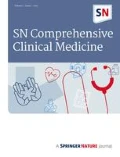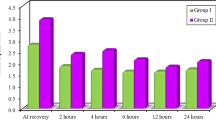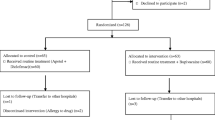Abstract
With an increasing obese population nationwide, there has been an increase in the number of laparoscopic surgeries performed. However, few studies have evaluated different methods to reduce pain in bariatric patients after laparoscopic surgery. Bupivacaine infusion pumps (On-Q® pumps) have shown efficacy in reducing postoperative pain in other surgical populations, such as orthopedic patients. Therefore, the purpose of this study was to investigate whether infusion pain pumps improve postoperative pain control and decrease length of hospital stay in bariatric patients. Between January 2015 and August 2016, 125 charts were retrospectively reviewed. Patients were divided into two groups: those who received infusion pain pumps and those who did not. The primary endpoints were hospital length of stay and the amount of postoperative narcotic use. Secondary endpoints included postoperative pain score, use of non-narcotics, and complications due to opioids or bupivacaine. There were 82 patients in the infusion pain pump group and 43 patients in the control group. Baseline characteristics were similar between both groups. There were no statistically significant differences in length of hospital stay (p = 0.39) or postoperative opioid use (p = 0.48) between the two groups. Although the median postoperative pain score was significantly reduced in the infusion pain pump group (3.5) compared to the control group (5) for the first 48 h (p = 0.002), this difference was not statistically significant for the first 24 h (p = 0.06). The use of infusion pain pumps did not significantly reduce the length of hospitalization and use of narcotics postoperatively.

Similar content being viewed by others
References
Barber FA, Herbert MA. The effectiveness of an anesthetic continuous-infusion device on postoperative pain control. Arthroscopy. 2002;18(1):76–81.
Cohen AR, Smith AN, Henriksen BS. Postoperative opioid requirements following Roux-en-Y gastric bypass in patients receiving continuous bupivacaine through a pump system: a retrospective review. Hosp Pharm. 2013;48(6):479–83.
Cottam DR, Fisher B, Atkinson J, Link D, Volk P, Friesen C, et al. A randomized trial of bupivicaine pain pumps to eliminate the need for patient controlled analgesia pumps in primary laparoscopic Roux-en-Y gastric bypass. Obes Surg. 2007;17(5):595–600.
Kahokehr A, Sammour T, Srinivasa S, Hill AG. Systematic review and meta-analysis of intraperitoneal local anaesthetic for pain reduction after laparoscopic gastric procedures. Br J Surg. 2011;98(1):29–36.
Medbery RL, Chiruvella A, Srinivasan J, Sweeney JF, Lin E, Davis SS. The value of continuous wound infusion systems for postoperative pain control following laparoscopic Roux-en-Y gastric bypass: an analysis of outcomes and cost. Obes Surg. 2014;24(4):541–8.
Sherwinter DA, Ghaznavi AM, Spinner D, Savel RH, Macura JM, Adler H. Continuous infusion of intraperitoneal bupivacaine after laparoscopic surgery: a randomized controlled trial. Obes Surg. 2008;18(12):1581–6.
Symons JL, Kemmeter PR, Davis AT, Foote JA, Baker RS, Bettendorf MJ, et al. A double-blinded, prospective randomized controlled trial of intraperitoneal bupivacaine in laparoscopic Roux-en-Y gastric bypass. J Am Coll Surg. 2007;204(3):392–8.
Acknowledgements
We would like to thank Dr. Carlos A. Barba, Marcela Montemayor, and the bariatric team for their dedication in providing excellent patient care. A special thanks also to Mary Dobbs for her assistance in screening possible electronic records for our study and technological support.
Author information
Authors and Affiliations
Corresponding author
Ethics declarations
Conflict of Interest
The authors declare that they have no conflict of interest.
Ethical Approval
All procedures performed in studies involving human participants were in accordance with the ethical standards of the institutional and/or national research committee and with the 1964 Helsinki declaration and its later amendments or comparable ethical standards.
Informed Consent
Due to the retrospective nature of the study, informed consent was waived by the board.
Additional information
This article is part of the Topical Collection on Medicine
Rights and permissions
About this article
Cite this article
Quach, N., Geng, S. & Nguyen, YN.P. An Analysis of the Efficacy of Continuous Bupivacaine Infusion Pump (On-Q® Pump) in Bariatric Surgery Patients. SN Compr. Clin. Med. 1, 26–29 (2019). https://doi.org/10.1007/s42399-018-0010-y
Accepted:
Published:
Issue Date:
DOI: https://doi.org/10.1007/s42399-018-0010-y




